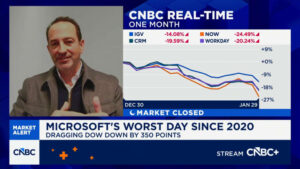Building a nest egg for retirement is never a bad idea, in my book. That said, I’d far rather buy FTSE 100 shares than funnel my cash into a bank account, even with the fact that the latter now offers higher rates of interest.
Let me explain.
‘Saving’ doesn’t work
While it’s a tough pill to swallow during a cost-of-living crisis, we all need to think about growing our wealth to ensure our ‘golden years’ (assuming we’re lucky enough to get there) are as comfortable as possible.
The problem is that cash in the bank doesn’t really grow. In fact, the presence of inflation means its value is gradually eroded over time. Yes, it’s safe and the interest rate is guaranteed.
But I only hold an ’emergency fund’ in cash. Everything else gets diverted to the stock market.
Trust in time
Why? Well, research has consistently shown that the stock market is the best way of building a wonderful retirement fund. This is because it tends to compound money at a higher rate.
Is this oversimplifying things? Yes, to a point. Investing can be psychologically demanding. It’s not easy seeing the price of something I own yo-yo.
However, I’d argue it’s less risky when adopting a long-term mindset. Think years (and ideally, decades).
Ultimately, the ‘secret’ to profitable investing isn’t a secret at all. It’s mostly about time, plain and simple.
Of course, picking great stocks that grow better than most won’t do any harm either!
So what makes a share a bargain?
Value is subjective. But buying a slice of a stock just because it looks cheap compared to the rest of the market feels like a poor way to invest.
It’s not hard to name companies that have failed to grow their investors’ wealth over the years.
Buy I won’t find many of these trading at high valuations. In investing (and life), I tend to get what I pay for.
Therefore, a bargain FTSE 100 share for me must always be one whose valuation is attractive relative to the quality of the business.
Here’s an example.
Top FTSE 100 stock
Shares in the consistently highly-profitable property portal Rightmove are now trading on a price-to-earnings (P/E) ratio of 22.
That’s actually high compared to the market as a whole. However, it’s also far below the company’s five-year average of 32. This suggests it might be worth buying a slice.
I’m inclined to think this business will recover its mojo, especially if we don’t get a serious recession in the UK.
An eventual reduction in interest rates could be the catalyst for a rebound in the housing market (and sentiment in Rightmove stock).
Never too late
Of course, more research into Rightmove is needed before pulling the trigger. Moreover, I can’t be sure that the stocks I do buy will necessarily perform well. Hence, diversification is still essential.
Yet the reward could be worth it, even if I were coming to the stock market later in life.
A 40-year-old able to put £200 a month to work in quality FTSE 100 shares and achieve a return of, say, 10% a year, would have almost £400,000 in 30 years. That’s not guaranteed, but it is perfectly possible.
I won’t get that kind of return from a savings account.
This post was originally published on Motley Fool







